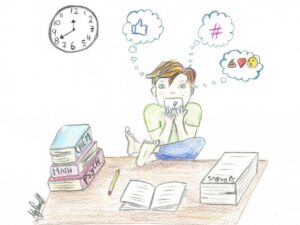Hobbies and habits, how they affect our daily lives.

Hobbies and habits, and how they affect our daily lives.
Hobby
Hobby can be anything a person likes to do in his spare time which can develop into something very important.
A person might take up a hobby because hobbies bring happiness, friendship, knowledge, inspiration, and relaxation.
Hobbies may also bring mental and physical health as well as wealth sometimes.
There is no man without a hobby.
The relaxation hobby brings makes life easier and provides a balance between work and play for people who work hard.
Many hobbies were first taken as pastimes have ended in lifetime jobs of relevance.
Hobbies have also led to some of the world’s greatest discoveries and inventions. From hobbies, people normally get useful knowledge.
Hobbies are as old as history because they were part of man’s nature since creation.
Men have enjoyed doing things, making things, and wanting to learn new things.
No matter the status or age of a man satisfying hobbies may be enjoyed by the rich, and poor, young, and old, sick and healthy. That is the beauty of a hobby.
Types of hobbies
There are countless hobbies of which some are thousands of years old and others too are new. Hobbies are being discovered now and then. Some hobbies require mental effort. Some others also require physical strength and endurance. Moreover, some hobbies add great knowledge to those who practice them whilst others are of little purpose. Some hobbies are solitary but others may bring valuable friendships. Hobbies can be classified into four.
- Doing things / Physical hobbies
- Making things / Intellectual hobbies
- Learning or studying / Creative hobbies
- Social hobbies.
Doing Things (Physical hobbies)
Hobbies of this class are perhaps the most common.
They include all kinds of games and sports, dancing, gardening, photography, amateur radio operating, and even rope tricks and magic.
Many hobbies in this class cost little or nothing, such as many games and sports.
Other sports such as baseball or ping-pong, polo, aviation, yachting, and big-game hunting.
Many people enjoy hobbies that require action, such as tennis, baseball, football, or basketball.
This enjoyment is nothing new. Since earlier times, men have taken pleasure in tests of their strength and endurance.
There are mental sports as well as physical sports. Sitting in an easy chair in his home, a person may enjoy anagrams, reading, storytelling, checkers, chess, and card games such as cribbage or bridge. These bring many people the same kind of relaxation that others get from physical sports
Many people may not become experts in the sport they choose. But they do enjoy the sport itself and benefit from the sense of physical well-being they get from the exercise and being out in the open air.
Learning or studying (Intellectual hobbies)
Almost all hobbies require some knowledge and a little study.
Some people make an entire hobby out of studying some particular subject. It may be languages, art, electricity, or architecture.
Whatever it is, the hobbyist will almost certainly find that his study has been profitable.
Some people take up such study hobbies only as a change from their everyday routine.
Others take up study hobbies in the hope that they may in the future be able to break into a new field of work.
Many people through their study hobbies have become experts and professional workers in their chosen fields.
Making Things (Creative hobbies)
Many people prefer to make new things.
This is especially true of individuals who spend their days in mental work. Such people find relief and relaxation in using their hands as a spare-time hobby.
Many kinds of tools and materials can be used in a hobby.
Many beautiful and useful articles can be made with wood, clay, leather, cloth, plastics, glass, linoleum, soap, cement, wax, and metal.
Making ship, airplane, train, and coach models is popular with many people.
Some people also choose to bind books, to weave, or to design furniture.
Others even find satisfaction in trying their hands at one of the arts. Most of them never become great artists. But they still get a great deal of pleasure from writing, painting, sculpturing, or playing a musical instrument.
People find that they have considerable talent. Many great artists started their work only as hobbies. Many people in recent years have found much pleasure in writing, staging, or directing amateur plays.
Others have found that there is as much fun to be found in domestic arts, such as cooking, sewing, and interior decorating.
Factors to consider when selecting a hobby.
- A person choosing a hobby should usually find something which will change his daily task.
It should be something fresh and new to which he can turn for relaxation when his day’s work is done.
People whose work involves physical labor will often choose a restful hobby but people who sit at desks all day will like to work with their hands.
- Interests and talents are major determinants of selecting a hobby.
We enjoy doing most of those things which we can do at least moderately well. It is a good idea in picking a hobby to study our interests and talents.
But many people have started hobbies in which they have little interest only because a friend or group of friends have taken up the hobby. Such hobbies are rarely satisfactory.
Rather, people should pick hobbies that will hold their interest and use their abilities. Only then can a hobby serve its proper purpose.
- Age and sex are important in the selection of a hobby.
- Location and availability of resources.
Habits
A habit is a behavior or action that has become automatic and ingrained through repetition and practice. It is a routine or pattern of behavior that individuals perform regularly and often unconsciously. Habits are typically formed as a result of consistent repetition over time.
Most habits originate in conscious acts but every time the act is performed, it becomes easier and simpler, until in time it ceases to need close attention or consciousness.
Attributes of habit
- Habits are developed through repeated performance of a behavior. The more frequently an action is repeated, the stronger the habit becomes.
- Habits are often triggered by specific cues or contexts. These cues can be internal (such as a certain feeling or thought) or external (such as a particular time of day or location).
- Habits can be both beneficial and detrimental. Positive habits, such as regular exercise, healthy eating, or daily reading, contribute to personal well-being and productivity. Negative habits, such as smoking, nail-biting, or procrastination, can have adverse effects on health, productivity, or personal goals.
- Habits are often performed without conscious thought or effort. They become ingrained in our daily routines and are executed automatically, often triggered by specific cues or contexts.
- Habits are not formed overnight but rather developed over time with consistent repetition. It can take weeks or even months to establish a habit.
Hobby VRS Habit
Hobbies and habits are two different concepts, although they can sometimes overlap.
- Engaging in a hobby is a voluntary choice. Individuals pursue hobbies based on their personal preferences and interests.
But habits can be both voluntary and involuntary. While some habits are consciously developed, many habits are formed without much thought or intention.
- Hobbies are primarily pursued for enjoyment, pleasure, and personal satisfaction. People engage in hobbies because they find them interesting, fulfilling, and enjoyable.
Habits, in contrast, are not necessarily pursued for pleasure or enjoyment. They may serve various purposes, such as maintaining personal hygiene, organizing tasks, or achieving specific goals.
- Hobbies are often leisure activities that individuals engage in during their free time. They are usually pursued intermittently and can be flexible in terms of time commitment.
Habits, by nature, tend to be more regular and frequent. They are often performed as part of a routine and can occur daily, weekly, or at specific intervals.
- Hobbies are activities that people engage in for enjoyment, personal interest, and relaxation. They are voluntary pursuits that individuals choose to do during their leisure time.
Habits, on the other hand, refer to repetitive behaviors or actions that are often performed automatically and unconsciously. They are ingrained patterns of behavior that people develop over time and can be both positive and negative.
- Hobbies often involve skill development or the acquisition of new knowledge. People engage in hobbies to explore their interests and enhance their abilities in a particular area.
While some habits may involve skill development, the primary focus of habits is not necessarily on acquiring new skills. Habits are more about repetitive actions that become ingrained in daily life
Join Enlighten Knowledge WhatsApp platform.
Join Enlighten Knowledge Telegram platform.






